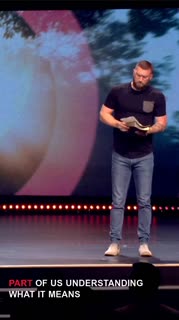Augustine's just going to stay in that water. You've got to get out of that water, Augustine.
Hey, we have a guest with us. I'm going to ask the captain. The camera's going to stay on stage just to kind of conceal his face. Emmanuel is a member of our church. He's from South Asia, and his dad, Emmanuel, is with us.
And so here's what I'd like you to do. He's over to my right, most of your left. He's over here. And you don't have to stand up if you don't want to. You can stand up. That's fine. But we'll keep your face concealed.
And so here's what I'd like you to do. If you're online, if you're in here, I just want you to extend your hands out. We're going to pray a blessing over him. He's in a country that is incredibly hostile towards the gospel. And he has called, and we're so thankful here, and you bless us with your presence. So we're going to pray a blessing over you.
Father, I pray for our brother in Christ, Pastor Emmanuel and his bride. I pray that you would shower blessing and favor and courage. May your presence be near. May he understand intimately and overwhelmingly that you have not left him, but that you are for him. That you've empowered him. And that you would give him great success and favor. As he adorns his life with steadfast faithfulness and love, may you give him success there in South Asia. May many South Asian men, women, boys, and girls come to faith in Christ. Your word tells us it's been granted to believe upon Jesus. But not only to believe, but to suffer. And in so many ways, he is living out Philippians chapter 1.
So we pray a blessing over him. May he be comforted and encouraged. And all God's people here at Graceland Church said for our South Asian brother, amen. Amen. You bless us with your presence. Amen.
Hey, I think one of the things that has—by the way, my name is Nate. If I've not met you, I've served here as a husband, as a dad, one of the pastors. Good to be with you this morning. My wife said, "Hey, what are you preaching Sunday?" And I said, "I'm preaching a text that talks about slaves and bond servants." She goes, "Can you just skip it? Could you skip that passage?"
And I would love to skip it. But some of you are so committed to the Bible that you're like, "Why didn't they do that?" And so I'd have to answer for you. Send me an email at tvalenty@graceland.church, tvalenty@graceland.church.
And I think one of the things that the church has really not done well is talk about work. We have talked about work in terms of sacred and secular. What I do is sacred work. And everybody else who's not preaching, teaching, or doing mission work is somehow secular. There's no such thing as the sacred-secular divide. All of life is all for Jesus. All of life is sacred.
Right? We just walk through this last week, Colossians 3:17. And today in Colossians 3:23. And whatever you do in word or deed, do it all unto the Lord.
And so a lot of Christians—I was talking to William Coy, who's doing our slides this morning. William Coy is a fifth-grade teacher over in Louisville. He teaches math and science. And I said, "Hey, William, you don't have to answer this question right now. But what's it mean for a fifth-grade teacher in a public school to put Jesus at the center of his work? How do you do that? How does a pilot who's a Christian, how does he put Jesus? How does she put Jesus at the center of her work?"
And I think one of the things we've not done very well in the church is have a very robust theology of vocation and work. And I hopefully want to talk about that this morning and shed a little light on that.
Before I do, we've got a couple of things that I've got to talk about and explain. So let's stand to read Colossians 3:22-4:1.
And here's what the word says. And let's read this out loud together. Just a couple of verses, but a lot to get after.
Bond servants, obey in everything those who are your earthly masters, not by way of eye service, as people pleasers, but with sincerity of heart, fearing the Lord. Whatever you do, work heartily as for the Lord and not for men, knowing that from the Lord you will receive the inheritance as your reward. You are serving the Lord Jesus Christ. For the wrongdoer will be paid back for the wrong he has done, and there is no partiality. Masters, treat your bond servants justly and fairly, knowing that you also have a master in heaven.
This is God's word written down and preserved for us, and we all said out loud, "We love your word."
All right, you may be seated.
Part of us understanding what it means to put Jesus first in our lives for our neighbors is that God has announced his kingdom through his son, Jesus. And Jesus comes onto the scene and says, "Your kingdom is at hand." The kingdom is the rule and the reign of Jesus. It's wherever authority and the benevolent rule and the merciful reign of Jesus exists. That's where the kingdom exists.
And so there's this cultural mandate, this cultural commission that we see in Genesis chapter 2 to rule and subdue. Work, as I'll mention later in the sermon, was created by God and it existed before the fall. Somehow we've relegated work just to be something that is a means to an end. But work is a sacred tool and task that God has given to us to enact. But what it is is a tool to announce and make much of his kingdom.
Now I want to give you a little context here as we talk about the big idea, which is Jesus at the center of our work. As you'll see on the screen, it's Jesus at the center of our work. And I'm going to call you at the end of the service to pray.
Perhaps in a way that might be a little different than we've actually called you to pray before. I want you to think about your job. I want you to think about your vocation, your influence. And perhaps you've never thought about your job as a tool to announce and spread the kingdom of Jesus. Or maybe you have, but you just don't know how. And I'm going to give you a couple of handles.
I'm certainly not going to answer all the questions about this really heavy, weighty, awesome topic. But I want you to think about, have I been using the influence, the plot of land that God has given to me to make much of Jesus?
Now a little context here. I want you to remember the context here in Colossians. You have one of two men who brought this letter back from Saint Paul, the Apostle Paul, who's in Rome. And they bring it back to the saints. And one of the saints that brought the letter back from Saint Paul in Rome in prison was a guy by the name of Onesimus.
Say Onesimus. Onesimus. Onesimus was a runaway slave, a runaway bond servant who ran away from his master Philemon. And he had become a Christian. And now he's traveled back to Colossae with the letter and the plan to return to his master Philemon.
Right? Got the context so far? Are you with me? A lot of people, a lot of theologians and commentators who've written books about books from the Bible believe that it's a very strong possibility that as Onesimus brought the letter back to the saints in Colossae, that they gathered in the house of Philemon, a master who probably had a large house.
And they gathered in the house of Philemon. And Philemon's the master. And he has his runaway slave, Onesimus, who comes back to bring the letter. And they're reading the letter out loud. And Philemon is there and also Onesimus.
And they just read what we read a couple thousand years ago, where he talks about slaves, bond servants, obey your masters. Now, you're thinking, this is—if the Bible ever was irrelevant, boy, here it is. And this is, I've got friends that have issues and accusations about the Bible. And you're mentioning a text. I'm really helpful. This will be great. I need to know what's going on because this seems like a very irrelevant, out-of-date text.
Now, what's going on here? The Bible is written to a particular people and a particular setting with particular circumstances. And Paul is writing to the saints in Colossae where there were a lot of slaves. It was part of the Roman Empire. And the Bible, as Pastor Tony said a couple years ago, quoted him last week. And every time I quote him, he gets $5. The Bible cuts and offends our moral sensibilities.
Last week, I talked about dads. Don't exasperate your kids. Stop being critical. Don't nag. Husbands, love your wives. And wives, submit to your husbands. And so it cuts and it sometimes wounds and exposes and offends our moral sensibilities through marriage and relationships and parenting and even work.
We are formed by the relationships that we find ourselves in or choose to be in. And one of the hallmark banners of our culture is freedom of choice, right? I want to do this. I want to do what I want. I want to go where I want, when I want it, where I want it. But there are guidelines and guardrails that God has instituted within the rhythms of our world that help us to drive down the road and to drive safely.
And if you find yourself bucking up against the creator of the universe, you're going to get splinters because he's created a right way in which we are to live.
Now, let's start by just real quickly stating what this passage is not teaching. This Bible, this passage is not teaching a justification of bond servants or slavery. It was wrong in every single instance. And the Bible does not make a case against slavery, though it goes and talks about in 1 Timothy 1 against slave traders.
Now, it's incredibly difficult at times to read passages and not read into the Bible some of our cultural understandings of what has happened within our country. You immediately think of slavery in the U.S., which was race-based and based upon a terrible slave trade with unspeakable cruelty that was largely removed by the influence of Christian men and women, namely a guy named William Wilberforce, all right?
The Roman Empire was made up, comprised of more than 50% were slaves, bond servants. And slavery in that context was not the same as slavery in the U.S. in the context here in the United States several decades ago. They were slaves because of economic reasons. You could sell yourself into slavery to actually take, to remove a debt. It was prisoners of war.
Slaves and free men and free women socially interacted. Slaves owned businesses, bond servants owned businesses. Many were very lucrative. They held positions in government. There was a law that more than half of the time you would actually get your freedom by age 30.
And so it's not the same, though I understand when we see the word bond servant, slave, we read into it, but it was not the same. It was very different. I'm not making a case. I just—we need to do the hard work of understanding the Bible. And the Bible has some hard things sometimes, doesn't it?
There's some difficult truths in the Bible. But what Paul is doing, he's not interested in blowing up an infrastructure that permeated the empire. What he's interested in this particular context is talking, how do I encourage you to live out your new humanity? How do I encourage you to be a man, woman, boy, or girl and live out the kingdom? The rule and the reign of Jesus within systems of brokenness, chaos, and rebellion.
Which is why we said the big idea this morning is Jesus at the center of our work. Philip Rikens said this about this passage: Christianity eventually did become the single greatest force in history for the eradication of slavery. Wherever Christianity has come to dominate a culture, the institution of slavery has been legally eliminated.
Now, what Paul is doing, he's calling bond servants and slaves to obey. What he's not doing is exploring every scenario where this might not be the case. Same thing that I mentioned last week about marriage relationships. Wives following their husbands. There's undoubtedly a multiplicity of examples where that would not be the case. Because when sin enters the scenario, where does submission stop? Right then and there.
Right? We understand that. So, there are moments where we need to work this out. I had somebody send me a message. I hope it's okay. I won't mention their name. But they said, "Hey, thanks for the message. That was a hard word. I appreciate you acknowledging that there's some of us in the room that have not experienced a husband who is loving and sacrificial. I hope one day to experience that."
And that's the case even with this scenario. Employers and employee relationships where you have a boss who's unkind, tyrannical, dictatorial, unmerciful, mean-spirited. How do you submit to that? And we'll talk about that here in just a moment.
Now, Paul is speaking to the heart. He says this. Look what he writes there in Colossians chapter 3. Obeying not as eye service, not just to be seen as serving and keeping up appearances, not as people pleasers, as if your service to your boss is dependent upon those watching you. But obeying with sincerity of heart. It could be translated singleness of heart.
Right? You know you've got kids that have done this. Grandkids. Perhaps colleagues. People that you've employed. And they might say, "I'm obeying you on the outside. But on the inside, I'm not obeying you." Or the little kid saying, "You know you tell your child, 'Hey, would you please sit down?' I'm sitting down on the outside. But on the inside, I'm standing up."
Like he's talking to us saying, "Listen, obey people in authority from your heart."
Now, I want to give you a little process to help us understand what's going on. It's going to be on the screen. It's a little wordy. It's the word exegesis, theological reflection, and then persuasion.
All right? We try to do this every week, though we don't talk about these words. So when I say exegesis, we walk through books, typically books of the Bible, chapters, verses, and words. And exegesis is helping us understand what did it mean to the particular audience there, the saints in Colossae.
So when Paul wrote Colossians, he had a particular meaning. We call it authorial intent. He was trying to convey something to the saints in Colossae. Then you move forward, you have theological reflection. Well, what is theological reflection?
You have Jesus who comes. He has a supernatural birth. He's always existed. God knew there was no way, the Father knew there was no way that we could get ourselves out of the brokenness and sin that started in Genesis 3 and is wreaking havoc upon every generation.
So he rides away in which his son, Jesus, comes and has a miraculous birth. He lives a perfect life. He dies on the cross for your sins. He's buried in a borrowed tomb because he only needed three days, and he's resurrected from the grave three days later. He appeared to many people. He ascended to the Father and he's coming back. There's the good news. There's the message of Jesus, okay?
And what happened in the book of Acts, the book of Acts is the gospel goes forth and what is birthed? What happens? What comes into existence? The church, the church, the universal church. And all over Turkey and modern-day Iraq, there's all these little churches that are sprouting.
And so the overwhelming use of the word church, ecclesia, in the gospels, in the New Testament, actually refers to local church. So there's local churches that pop up all over and then Paul would write letters to the saints in Ephesus, modern-day Turkey, to the saints in Thessalonica, Thessalonians, to the saints—I need to slow down. Sorry, Angie. Saints in Colossae, right?
So you have cultural setting, audience. Then you have the gospel. Then the church, then the church is born. And then we come into the scene 2,000 years later.
So what we do a lot of times when we read the Bible, we read the Bible and say, "What's this mean to me? What's this mean to me?" And what do we skip over? We go from persuasion all the way back to exegesis. But what do we miss? Theological—say it with me—Theological. Where's the power? Where's the power to do this? In the gospel.
So you gotta go through the gospel. What was Jesus writing through the penmanship of Paul about the gospel that influenced this cultural setting? And we go all the way back to 2024. What does this mean for me? It means make Jesus the center of your work in all that you do.
That's what he was trying to tell them. And the spirit of God is telling us today. There's lots of application. I don't have time to go into all the application. I could, as one high school student told me last night as I was spending time with his family. He says, "Why don't you just do what you do every week?" I said, "What's that?" He goes, "Just go over your time."
So I appreciate that, Bryson Nesmith. But here's what he's saying. He's talking about making Jesus the center of your work. He says the same thing in verse 23 as he said in verse 17. He wants them to know, obey authority. Obey authority.
Jesus transforms your perspective to work as you're working for him and know, as he says, that not one act of your obedience goes unnoticed and unrewarded.
So let me give you some application. He's talking about things that are counter-cultural. Be salt and light. Let me give you some instructions on how to live, how to work, how to submit to authority. He's not giving an opinion piece about all of your circumstances that you find yourself in. Whether it's your job or your house, in terms of Christian relationships, or your boss, your family.
What you can control is yourself. What you can control is yourself. And the word obey is the same word used for kids with parents, employees, Christian men, Christian women. Obey your authorities. The limit to the obedience is clear. When sin comes in, when a boss calls for an employee to sin, lie, cheat, steal, engage in immoral behavior, our obedience stops because our ultimate authority is who? Our ultimate authority is God.
But he's calling men and women because of the humanity that is recreating, because we are made in the person of Jesus. We are a new creation. He wants us to obey our authority.
So he says several things. Work hard. Don't be lazy. Be sincere. Know you're not forgotten. Your service does not go unnoticed. You'll be rewarded. Your service is unto Jesus. So think heavenly. Think upward.
And one pastor said this, and I love this quote: "Christ is the head of the house, the unseen guest at every meal, the silent listener to every conversation. He knows it all, and nothing surprises him."
So let Jesus be at the center of your life wherever you find yourself in. He has a word to bosses. What does he say there in the verses? Bosses, be just and fair. It's a word, a couple of words, that actually means live according to God's law. Be just. Be righteous. Be caring. Be honest. Compensate your employees well. Don't be miserly. Be generous.
Why? It reflects the generosity of God, who's just and fair and caring and righteous, so we are to reflect the character and the person of God even in our employer-employee status.
So here's some more truths, and I'm gonna wrap it up. Work has dignity. Somehow we've thought that what Pastor Tony does or what Corinne Nesmith does at the church, they get paid full time. What they do is really—that's dignified work. That's respectable work. That's sacred work. But all of life, it's sacred because all of life is for Jesus.
As Paul says, whether you eat or drink and word or deed, do it all as you're working heartily unto the Lord. Work is created and given by God before the fall. It existed. Adam and Eve, it was perfect.
You know, the lion, tigers, and bears, oh my, they weren't going around devouring each other. Thorns and thistles weren't coming up out of the ground. It was easy, harmonious, life-giving work, and then the fall happens, and what happens? Devastation and destruction.
You're not gonna go pet the lion anymore, you know? You know, there's thorns and brambles, and by the sweat of your brow, and sin and chaos and rebellion, and the created order is revolting.
There weren't any hurricanes in the Garden of Eden. There weren't any tornadoes. There weren't any flash floods. Everything was in its right, proper, harmonious order, and then sin entered, and it's devastating everything. It's infiltrated work, but work is dignified. It's created by God pre-fall.
I'll talk more about that here in just a minute. Work can't be—even though we're talking about the dignity of work, the sacredness of what you do, work can't be our identity. Our identity is in who? Our identity is in Christ.
And what happens when you make work your identity? When you're great, it goes to your head and your heart, and life is good, but when work's not going well, you're devastated and despondent because you've made work your identity. Our identity is Christ, and he's given us tools where we live, work, and play our job to till this land for the kingdom of Jesus, to make much of the rule and the reign of Christ.
Work is a tool that Jesus uses to spread his kingdom. Here's what I want—I'm gonna close with this. You won't make a lot of sense about your work if you don't see it within a story.
If you don't see it within a story, it's on the screens. Faith is to intersect, inform, educate everything that you and I have. Everything that I do, I'll do everything I can. You can't watch the movie and not see it because you don't see it. You see it all the time on the screen. There's nothing there.
But that's what I want you to do. Be grateful, be grateful for the life you're going to be grateful for, and it's called a great, good work of God. And this is exactly what I want you to do. What I want you to do is know that it's not God, it's a curious creation. I want you to know that God's created something and I want you to know that he's created something.
Everything that he created was good. Work was described as good. It existed before the fall. We're fallen. In Genesis 3, Adam and Eve did not trust the character and the word of God. Everything comes down to trust.
Adam and Eve didn't trust God, didn't believe God. Do you right now trust God? If you trust God, you will align your life to what God has said. Just this past week, talking to somebody who doesn't go here, their life is lived in contrast to what they professed in the last several years, and it comes down to, "I'm not gonna trust what God says is the word. I'm gonna trust me and my heart."
God is into a world of trouble, and it's still to this day. But the fall, everything has been corrupted. Not just the fact that we are separated from God, not just that there's enmity and strife with relationships, but work has been corrupted and perverted, right?
I mean, work is hard, isn't it? Work's difficult. Sometimes I love my job. I mean, there's not a week, a day that goes by that I am not full of gratitude. Even in difficult times, I'm so full of gratitude about what I get to do. I mean, it's such a gift in my life.
But there's difficult aspects of my job, and there's difficult aspects of your job. The fall has infiltrated and tarnished everything. Redemption, you're forgiven, you're a new person in Jesus, and all things are being made new through the gospel of Christ.
Restoration is that God's gonna not just usher in a new world, but he's remaking this world, and your kingdom come on earth as it is in heaven. And one of the ways that God does that is through work. He does it through work.
So here's some real practical questions, all right? What's it mean to be a Christian social worker? What's it mean to be a Christian engineer? What's it mean to be a Christian pilot? What's it mean to be a Christian teacher, Christian artist, Christian banker, right?
I had one person say, to be a Christian pilot is to not come over the intercom and say, "I wanna talk to you about the gospel." Okay, you probably can't do that. And if you're a UPS pilot, you're talking to boxes, so that's not gonna really help.
One person said, if you're a Christian pilot, here's what you need to do. Land the plane. And do it well. So that's helpful, all right? Because a lot of us think, "Oh, to be a Christian, I gotta go start a Bible study in my work. I gotta constantly evangelize." Yes, but it may not look like having Bible studies.
We need to think more. We need to think more thoughtfully and strategically and biblically. What's it mean to be a neighbor, financial planner, accountant? A Christian engineer looks at the chasm of the Ohio River and says, "How are we gonna get across that? I'm gonna build a bridge."
Human innovation. Feats of incredible innovation, right? The Bible says in Genesis 3, part of the cultural mandate is to rule and subdue. Rule and subdue. Isn't it amazing all the things that God has allowed us to discover?
I could go to a urologist. And I've had 29 kidney stones. There's just a lot of sin in my life. And they'll look at the composition of a stone. I know that's kind of weird some of you have, but look at the composition of a stone. And they'll say, "Don't eat that. Eat this."
Which, by the way, you can't eat spinach and blueberries and nuts. All the stuff that I thought was good for you, right? They're saying, "Don't drink soda and don't drink pasta." And there's a why. There's a way in which God has physiologically made us.
Does that bring glory to God? Yeah, it does. There's a right way to do things. What about a Christian teacher forming a mind? What about a Christian State Farm agent? We have one of those, several of those in our midst.
One guy, his job is to investigate people who make claims that are dishonest. He's put people in jail before. They're trying to get money from State Farm. What's he doing? He's actually—there's such a thing as truth. There's such a thing as falsehood. There's such a thing as right. There's such a thing as wrong.
I can't answer all of those scenarios for you, but I want us to understand part of a theology of work, putting Jesus at the center of our work, is understanding God has given each of you a little parcel of land, and part of your job is just to make Jesus known and to enhance the lives of the people around you.
Order, beauty, design to reflect the character and the message of Jesus is to put Jesus first in your life. So here's some examples. Further social justice in the world. Be honest and evangelize your colleagues. To do your job with great skill and excellence and competency. To create beauty. To work from a Christian motivation to honor God, seeking to engage and influence the people around you.
Work with a grateful, joyful, gospel-changed heart through all the ups and downs. Make as much money as you can so that you can be as generous as you can be.
So how are we gonna do that? Like, what's it mean to put Jesus at the center of our lives? Let me give you an example. Right now, there's a guy named Noah Jones. Noah Jones is a member here. And I love Noah. He graduated from college. He's studying to be a pastor, so he may want to stay here in the States or go overseas to do international missions.
And last week, I got a text from a leader in our community, and they said, "Hey, I got a church, a small Southern Baptist church, in the eastern part of the state, and they don't have a preacher November 10th. Would you have somebody that could go and preach?"
And so I sent a message out, Pastor Tony and I sent a message out, and Noah said, "Me, I'm there." And right now, he's preaching at a church a couple hours away. That's great, yeah.
But here's how we're gonna reach Southern Indiana. It's not through 100 more Noah Jones. Like, if you want to study for ministry, if you want to go to the nations, we have lanes for that. We'll equip you, we'll challenge you, and we want to send you out. We want to raise up men and women that love Jesus, that want to earn a living by doing this.
So we need that, and we're gonna continue to be about that. But here's what we really need. We need more Ryan Cooks, Annie Kirshners, Brenda Winghams, Evan McCoys, Debbie Ogdens, Michelle Kavanaugh, Perry Bashams, Lincoln Jones.
God has placed you where you live, work, and play, connecting spouses all over Southern Indiana, being a doctor, being a high school teacher, being an electrician in your neighborhood, at the YMCA, to love him, to do your job with skill and an expectation and a crystal clear understanding that you're taking Jesus wherever you go.
It's not—we're gonna not reach Southern Indiana through good preaching and good music and good programs. It's never been about what's in the room. It's about what's out there in you.
How are we gonna reach Southern Indiana? God's plan A is not come to Graceland at 9, 10, 30. God's plan A is this: you're loved and you're sent to make Jesus the center of your work. That's how we're gonna reach.
I can't go into the marketplace. I can't go in your neighborhood. I can't go to your business. I can't go to school. God has sovereignly placed you where you live, work, and play to be the fragrance of Jesus.
And it doesn't just—look, start a Bible study. It might be that. But how do I do my job with skill and excellence and competency? Christians should be the best at whatever we do.
Why? We live for the glory and the renown of the King who created the universe. Let's be ambitious people and acknowledge that. Expectant people, all right? God has sovereignly created you and you are God's plan A.
Let's put Jesus at the center of our work. All right, I'm gonna pray.
God, we need you. We need you to remind us, teach us. Perhaps we've not thought about our work as a spouse, as a mom, as a dad, as an electrician, as a doctor, as an engineer, as a teacher, as an accountant, as a janitor. Perhaps we've not thought about these things as thoughtfully as we should.
Help us to put some feet to what it means to make you, Jesus, the center of our work. We need you. We need you and we wanna see your name be made much of. So teach us. Illuminate our hearts and minds, Holy Spirit.
We wanna see the kingdom of Jesus, the rule and the reign, the gracious rule, the benevolent reign, the merciful reign of Jesus to go forth on the highways and byways all over southern Indiana, even reaching the state of Indiana. Even reaching the state of South Asia.
We pray this expectation. And everybody said amen.
So here's what I wanna do. I want you to stand. Pastor Ryan is gonna lead us in a song of response. Here's what I want you to think. Am I using my influence, my job, for King Jesus? Have I really thought about the fact that God has providentially placed me?
So maybe you just need to come up and let's just—God, I'm surrendering to you. Help me understand. I don't know everything about what that means, but I wanna press reset and I'm saying, I'm yielding my life to you.
And there should be—this is not pastoral guilt, but I'm not above it. There should be a lot of people in the room that said, "My life is yours. Use my job where I live, work, and play."
There should be a spirit of urgency and God's gonna use you. So let's, with yielded hands and yielded hearts, let's lean into this time, all right?











